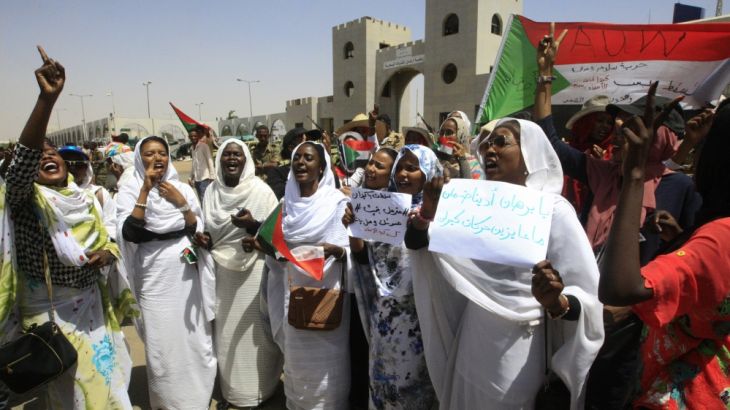Sudan’s military holds talks with protesters as curfew lifted
Meeting comes as new leader of military council promises to hand over power to civilian government within two years.

Sudan’s ruling military council has held talks with the organisers of mass protests demanding a civilian-led transition to democracy after the overthrow of longtime ruler Omar al-Bashir.
Saturday’s meeting in the capital, Khartoum, came as the new leader of the council, Lieutenant General Abdel Fattah al-Burhan, promised to hand over power to a civilian government within two years following consultations with opposition groups.
Keep reading
list of 4 itemsOusted President al-Bashir in Sudan military hospital, army says
Sudan’s pro-democracy activists mark anniversary with protests
Sudan military leader urges troops to back democratic transition
Omer Eldigair, of the 10-member delegation representing the protesters at the talks with military leaders, told reporters the group delivered their demands, including the formation of a civilian-led transitional government and the release of protesters. He did not elaborate further.
The military overthrew al-Bashir on Thursday after almost four months of protests calling for an end to his nearly 30-year rule. General Awad Ibn Auf had initially taken over as the head of the military council, but he resigned just a day later amid a public outcry, with protesters saying he was too close to the deposed leader.
Al-Burhan, who replaced Ibn Auf, previously served as the general inspector of the armed forces and had met the protesters in the streets after al-Bashir’s removal to listen to their demands.
The commander of the paramilitary Rapid Support Forces, Mohamed Hamdan Dagalo, also known as Hemeti, was appointed as al-Burhan’s deputy late on Saturday. A day after al-Bashir’s removal, Hemeti had previously urged the military council to hold talks with protesters.
![Lieutenant General Abdel Fattah al-Burhan, the new chief of Sudan's ruling military council, vowed to 'uproot the regime' of deposed leader Omar al-Bashir [Sudan TV/AFP]](/wp-content/uploads/2019/04/f2c56731c02b4d16a90661efb1a2fe10_18.jpeg)
Al-Burhan, in his first televised address to the nation, said talks would include “all the people of Sudan, including political parties and civil society groups”.
The military council will rule the country for up to two years until elections, he said, reiterating a position outlined by the council the previous day. However, he lifted the nighttime curfew imposed on Thursday, which was to last for a month from 10pm to 4am, and vowed to “uproot the regime” of al-Bashir and its symbols.
He also promised to bring to justice those involved in the killing of protesters.
‘This will not stand’
Activists, however, have said they will remain on the streets until a civilian transitional government, as outlined in the so-called Declaration of Freedom and Change signed by various political and professional groups in January, is formed.
They fear the military, which is dominated by Bashir loyalists, will rule indefinitely or hand power to one of its own.
Speaking to reporters minutes before al-Burhan’s address, political parties and movements behind the protests said they were ready to meet the military to discuss the transition and announced the formation of a 10-member delegation to introduce the people’s demands to the military council.
“We and all the opposition parties refuse to hand over power to the military. We want a totally civil leadership,” said Salah Sanhori, a member of the Baath Party.
Meanwhile, the Sudanese Professionals Association, the umbrella group at the forefront of the protests, urged demonstrators to continue a seven-day sit-in outside the army headquarters in Khartoum.
Al Jazeera’s Hiba Morgan, reporting from the capital, said despite Burhan’s apparent conciliatory gestures, key differences remain.
“It’s very hard to see the military council saying to the protests’ organisers: ‘We will step back and let you run the show’,” she said, adding: “Ultimately, those who will decide the fate of the council and the talks are the people who have been protesting for nearly four months now.”
Hassan Zain, a protester, welcomed talks between the two groups but said he felt Burhan’s speech was “no different” to that by Ibn Auf.
“This will not stand,” he told Al Jazeera from Khartoum. “A two-year transition period is too long. They [military council] need to shorten this period.”
He added: “People are still upset and are still protesting outside the army headquarters.”
Intelligence chief resigns
Sudan’s protests began in December, sparked by high food prices, but quickly escalated into an uprising against al-Bashir, who seized power in a bloodless military coup in 1989.
Security forces loyal to al-Bashir responded to the protests with a violent crackdown, killing dozens of protesters, according to activists.
The Sudan Doctors Committee says at least 38 people, including six soldiers who intervened to protect the protesters, have been killed since the sit-ins began on April 6. A spokesman for the police said at least 16 people were killed by stray bullets at protests and sit-ins on Thursday and Friday.
Earlier on Saturday, the state-run media announced the resignation of Lieutenant General Salah Abdallah Gosh, who as the head of the National Intelligence and Security Services had overseen the crackdown against the protesters.
Once a member of the president’s inner circle, Gosh was sacked as an adviser in April 2011 for criticising the government. He was arrested the following year on suspicion of involvement in a coup attempt but was later pardoned by al-Bashir, who appointed him the intelligence chief in February 2018.
Mohammed Amin contributed in this report from Khartoum